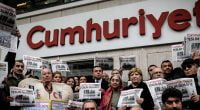Keyword: Military coups in Turkey

Turkish Gov’t Unveils 16 Ways to Identify Gulenists [as Terrorists]
Turkish authorities have finally come up with a detailed set of measures and criteria to identify suspected Gulenists. After its publication and prime minister’s announcement, critics argued that this presents a perfect textbook of fascism as the government justifies its actions, purges on ludicrous charges devoid of a legal base in universal standards and even country’s current laws.

Another ‘coup suspect’ found dead in Turkish prison, bringing total to 21
At least 21 people have reportedly committed suicide either after they were imprisoned over ties to the movement or after being linked to the movement outside prison. The relatives of most of them claim that the detainees are not the kind of people to commit suicide, shedding doubt on the official narrative. Rumours also have it that some of the detainees were killed after being subjected to torture under custody.

EU report expresses concern about purge against Gülen movement
The progress report on Turkey that was issued on Wednesday by the European Commission expressed concern over the Turkish government’s purge against Gülen movement members, saying “any allegation of wrongdoing needs to be examined with due process, transparent procedures, and the right of every individual to a fair trial or equitable administrative process should be safeguarded.”

Turkey’s Erdogan and onslaughts against opposition
Gulen movement, which is inspired by the highly-respected United States based cleric, Fethullah Gulen, has been brazenly targeted for total destruction by President Erdogan after the failed coup in that country few months ago. The iron-hand President accused members and sympathisers of the movement as being behind the coup.

German state minister: Persecuted Turks can apply for asylum in Germany
“Germany is an outward-looking country and is open to all those who are politically persecuted as a matter of principle,” Roth said. “They can apply for asylum in Germany. That applies not just to journalists.” Roth also spoke out against Turkish President Recep Tayyip Erdogan’s crackdown against opposition lawmakers and critical journalists and academics.

Turkey’s ‘Nazi-style’ purge of academia condemned
The mass sacking of more than 1,200 academics in Turkey has been compared to tactics used in Nazi Germany. Jean Asselborn, Luxembourg’s foreign minister, made his comments shortly after Turkish authorities released a list of 1,273 academics fired from public universities on 29 October.

Turkey’s treatment of dismissed officials reminiscent of Nazis: Luxembourg
Luxembourg’s foreign minister said on Monday that the Turkish government’s handling of civil servants dismissed after a failed coup attempt reminded him of methods used by the Nazis, and that sooner or later the EU would have to respond with sanctions.

After The Coup Attempt, A Crackdown In Turkey
Once considered a beacon of hope for the Middle East, Turkey has been rapidly backsliding on issues of democracy, freedom of the press, and human rights. One would have thought this downfall hit bottom on July 15, when a bloody coup was attempted, leaving behind more than 250 dead.

Report: Turkey’s purge risks isolating its higher education from int’l academia
Turkey’s purge of academics has already harmed the reputation of its higher education sector, the latest Free to Think report from the New York-based Scholars at Risk (SAR) noted adding that it risks greater damage by isolating Turkish scholars, students, and institutions from the international flow of ideas and talent.

In Erdogan regime western-oriented intellectuals, bureaucrats, liberals, Kurds, civil society activists in mortal danger
Those in prison—educated, Western-oriented intellectuals and bureaucrats, liberals, Kurds, civil society activists, and supporters of exiled cleric Fethullah Gülen—are in mortal danger. When blood flows from the prisons, it will be no accident nor should anyone believe Erdogan’s security forces were simply reacting to a crisis.

Turkish business suffers under Erdogan’s post-coup Gulen purge
Critics of the ruling AKP expect it to sell Gulen-linked companies to government allies in the business world at a large discount. In mid-October the AKP-linked Metro Holding applied to the TMSF to acquire all of Koza Ipek Holding’s shares. Akin Ipek, the fugitive former owner of the conglomerate, asked on Twitter how Koza Ipek’s $600 million in cash and $20 billion in mining assets could be acquired by a comparatively unimpressive entity. Metro Holding’s capital comes to just over $95 million.

What Is Next In Turkey?
The generals were never the script writers of the coups but only players. The script writers of the coup on July 15 in Turkey aimed to simulate a coup as if it was staged by the Gulen movement. It was simply a false flag. While only a few hundred soldiers were involved in the coup, more than ten thousand officers were purged and arrested. While the police officers challenged the coup plotters, twelve thousand police officers were fired two months after the coup.




















